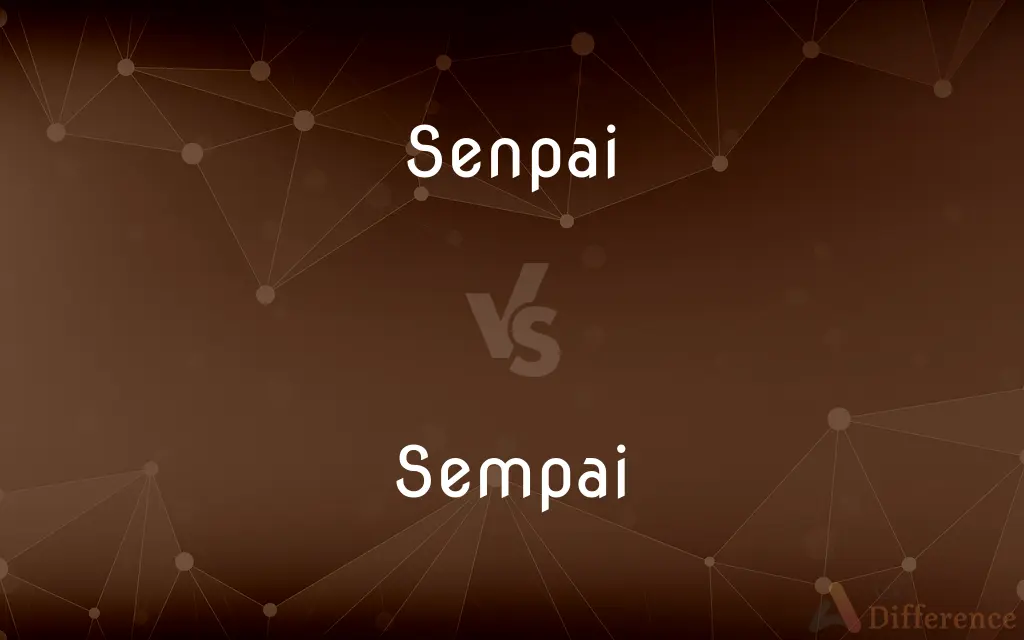Senpai vs. Sempai — What's the Difference?
By Tayyaba Rehman & Urooj Arif — Published on January 30, 2024
Both refer to a senior or someone of higher rank or age, common in Japanese culture. The difference lies only in romanization.

Difference Between Senpai and Sempai
Table of Contents
ADVERTISEMENT
Key Differences
The term 'senpai' is a Japanese word used to address or refer to a senior colleague or an individual of higher experience, age, or rank. It is often used in schools, businesses, and sports clubs. 'Sempai' is simply another way of spelling 'senpai'. It reflects a different style of romanization of the same Japanese word.
The use of 'senpai' in Japanese culture emphasizes respect and acknowledgment of the hierarchical relationships in various social and professional settings. While 'sempai' is less commonly used in English, it holds the same meaning and cultural significance as 'senpai' in recognizing authority or seniority.
In educational settings, 'senpai' is used by juniors to address their senior students, reflecting the respect for those with more experience or knowledge. In the same context, 'sempai' would be used identically, with the choice of spelling depending on the romanization system.
The popularity of anime and manga in the West has led to a broader use of 'senpai', often in contexts relating to mentorship or admiration. Despite being the same word, 'sempai' is less frequently used in Western pop culture, but when used, it conveys the same connotations of respect and seniority.
In professional environments, 'senpai' refers to a colleague or supervisor with more experience, and addressing someone as 'senpai' is a sign of respect. Similarly, 'sempai' in a professional context would be used to show respect towards a more experienced colleague or supervisor.
ADVERTISEMENT
Comparison Chart
Pronunciation
Same (sen-pie)
Same (sen-pie)
Meaning
Senior, elder, or someone with more experience
Identical meaning: senior, elder, or more experienced individual
Usage in Japanese Culture
Widely used to denote respect for hierarchy
Identical usage in denoting respect for hierarchy
Romanization System
Hepburn system, more common in English
Kunrei-shiki or Nihon-shiki, less common in English
Popularity in Western Culture
More common, especially in anime and manga fandom
Less common, but identical in meaning and use
Compare with Definitions
Senpai
A senior or more experienced person in a specific context.
In our karate club, we always show great respect to our senpai.
Sempai
A mentor or experienced individual in a particular hobby or profession.
My sempai in photography has been guiding me through different techniques.
Senpai
Someone admired or acknowledged in a social or professional setting.
He's my senpai in the gaming community, known for his incredible skills.
Sempai
A respected figure in a social or professional circle.
She is my sempai at work, always guiding me through complex projects.
Senpai
A term of respect for someone with higher rank or age.
In our company, we often seek advice from our senpai.
Sempai
A senior, especially in schools or workplaces, respected for experience.
I always ask my sempai for help with difficult math problems.
Senpai
An upperclassman or elder in a school setting.
As a freshman, I look up to my senpai in the school band.
Sempai
An elder or upperclassman in an educational institution.
Our sempai in the science club led us to victory in the competition.
Senpai
A mentor or role model in a particular field or activity.
My senpai in the art club has taught me so much about painting.
Sempai
Someone of higher rank or seniority deserving respect.
In our dojo, the sempai demonstrate the techniques first.
Senpai
The senior member of a group in Japanese arts; a mentor.
Senpai
An upperclassman or elder student.
Common Curiosities
Can 'sempai' be used interchangeably with 'senpai'?
Yes, sempai can be used interchangeably with senpai, as they are the same word in Japanese.
What is 'senpai'?
Senpai is a Japanese term for a person of higher rank, age, or experience, often used in educational and professional settings.
Is 'sempai' different from 'senpai'?
Sempai is just an alternate spelling of senpai; both words have the same meaning and usage.
Is 'senpai' a formal title?
Senpai is not a formal title but a colloquial term of respect and recognition of seniority or experience.
Do Japanese people frequently use 'sempai'?
Japanese people frequently use 'senpai', and 'sempai' is just a less common romanization.
How did 'senpai' become popular in Western culture?
Senpai became popular in Western culture primarily through Japanese media like anime and manga.
In what contexts is 'senpai' used?
Senpai is used in schools, workplaces, and social groups to address or refer to someone more experienced or senior.
Why are there two spellings, 'senpai' and 'sempai'?
The different spellings result from variations in romanizing the Japanese language.
Has the use of 'senpai' spread outside of Japan?
Yes, the use of senpai has become popular worldwide, especially among fans of Japanese anime and manga.
Can 'senpai' refer to someone of the opposite gender?
Yes, senpai can refer to a person of any gender; it's about rank or experience, not gender.
How do you pronounce 'senpai'?
Senpai is pronounced as 'sen-pie', regardless of the spelling.
Can 'sempai' be used in casual conversation?
Yes, sempai can be used in casual conversation, just like senpai, to refer to someone senior or more experienced.
What does it mean to be someone's senpai?
Being someone's senpai means being recognized as their senior, mentor, or someone they respect for experience or knowledge.
Is there an equivalent term to 'senpai' in English?
There isn't a direct English equivalent, but terms like 'mentor', 'senior', or 'upperclassman' are similar in concept.
Is 'senpai' used in professional environments in Japan?
Yes, senpai is used in professional environments in Japan to address colleagues with more experience.
Share Your Discovery

Previous Comparison
Goth South Park vs. Emo South Park
Next Comparison
Beforeall vs. BeforeeachAuthor Spotlight
Written by
Tayyaba RehmanTayyaba Rehman is a distinguished writer, currently serving as a primary contributor to askdifference.com. As a researcher in semantics and etymology, Tayyaba's passion for the complexity of languages and their distinctions has found a perfect home on the platform. Tayyaba delves into the intricacies of language, distinguishing between commonly confused words and phrases, thereby providing clarity for readers worldwide.
Co-written by
Urooj ArifUrooj is a skilled content writer at Ask Difference, known for her exceptional ability to simplify complex topics into engaging and informative content. With a passion for research and a flair for clear, concise writing, she consistently delivers articles that resonate with our diverse audience.














































